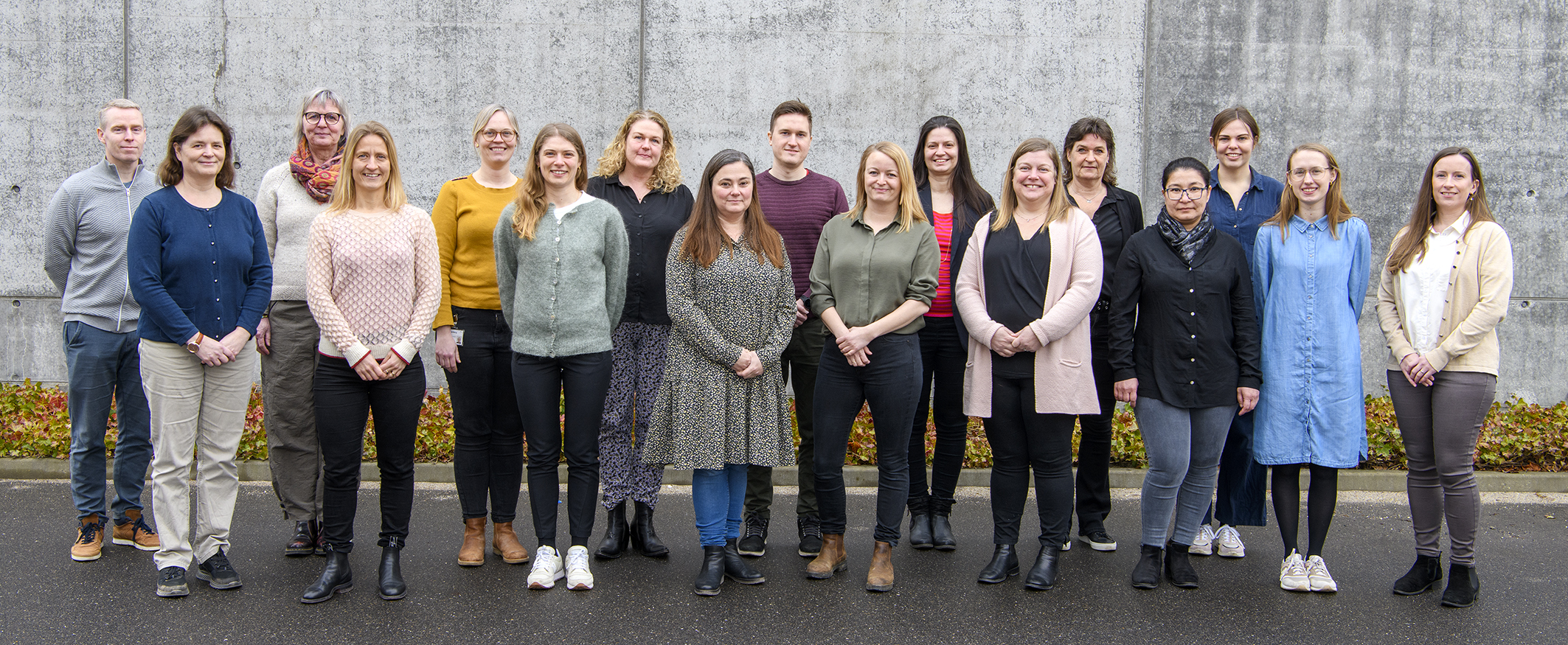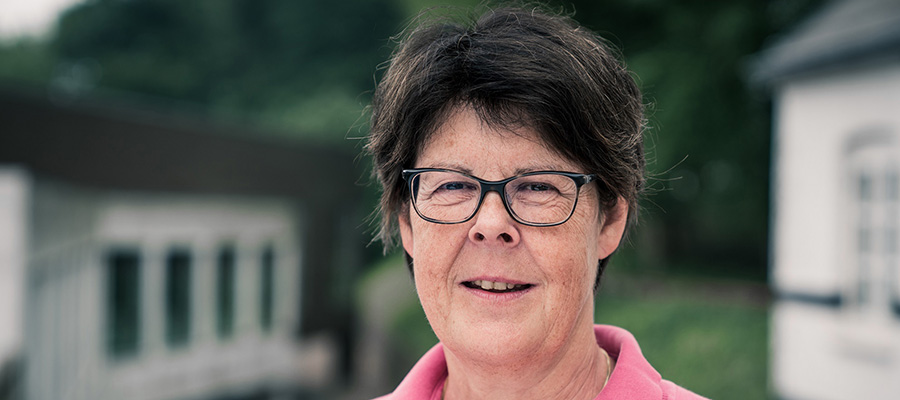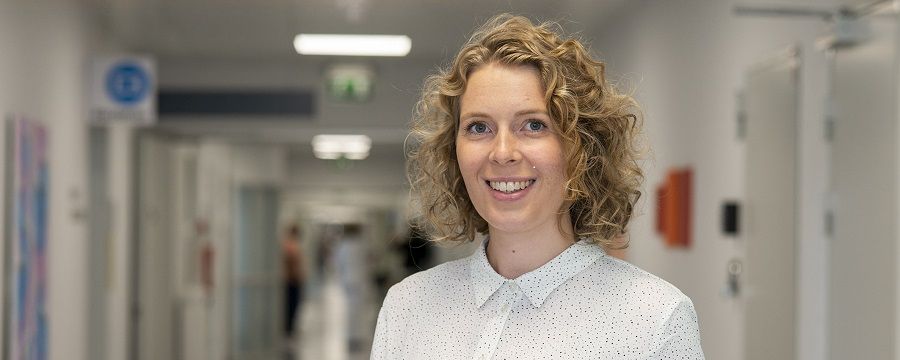Researcher profiles

Senior Staff
![Adrian Edwards - Photo[1].jpg](/contentassets/4bfa6128080b4991a52a95542dc40381/adrian-edwards---photo1.jpg)
Adrian Edwards is a Professor of General Practice and Co-Director of the Division of Population Medicine at Cardiff University, UK. Adrian Edwards has been an Honorary Professor at Aarhus University since 2012, and was affiliated to the Department of Public Health Programmes, Randers Regional Hospital, in 2016.
Key research interests include shared decision-making, risk communication, health literacy, and support to patients with chronic diseases. He is actively involved in the Department's research on screening participants' attitudes, decision-making, coping, and risk perception.
Contact information:
- E-mail: edwardsag@cardiff.ac.uk
- Tel.: 02920 687186
- Link to profile at Cardiff University

Lone Kjeld Petersen is Chief Physician and Professor at Department of Obstetrics and Gynaecology at Odense University Hospital and the University of Southern Denmark. Lone is appointed Honorary Professor at the University Research Clinic for Cancer Screening, Department of Public Health Programmes, Randers Regional Hospital, as per March 1st, 2024.
Key research areas include cervical cancer screening with specific interest in the diagnostic process, HPV diagnostics, self-sampling and screening derived gynecological activities. She is actively involved in the Department's research on cervical cancer screening.
Contact information:
- E-mail: Kjeld-Petersen@rsyd.dk
- Tel: +45 30576810
- Link to profile at University of Southern Denmark
- ORCID: 0000-0002-1424-6170

Berit Andersen is Clinical Professor at Aarhus University and Chief Physician at the Department of Public Health Programmes.
Berit Andersen is specialised in Community Medicine and her research focus is public health interventions with special emphasis on public health perspectives on screening programmes.
Berit Andersen takes part in the organisation of cancer screening on national level as head of the national steering committees for breast cancer screening (NSBS) and cervical cancer screening (NSLS) and as member of the steering committees for the Danish quality database for cervical cancer screening (DKLS), colorectal cancer screening (DTS), and mammography screening (DKMS). She is also member of the Danish Health Authority's advisory committee on screening programmes and the professional committee of the Danish Comprehensive Cancer Center (DCCC). Also, Berit Andersen is vice-chairman of the Danish Council on Ethics.
Examples of ongoing research:
- Interventions to increase screening participation
- Interventions to reduce social inequality in screening
- Self-sampling for cervical cancer screening
- Decision aids for participation in cancer screening
- Benefits and harms of cancer screening programmes
- Quality of screening derived clinical procedures
- Screening of older women for cervical cancer
- Screening participants' experiences with positive test results
- Intersection between HPV vaccination and cervical cancer screening
Contact information:
- E-mail: berand@rm.dk
- Tel. +45 7842 0171
- Link to profile at Aarhus University
- ORCID: 0000-0003-4074-6504

Pia Kirkegaard is Associate Professor at Department of Clinical Medicine, Aarhus University, and a Senior Researcher at the Department of Public Health Programmes, Randers Regional Hospital.
Present research areas focus on screening and follow-up seen from the citizen's perspective. The overall approach is exploratory qualitative research based on sociological theory and she specialises in interviews, focus groups, and field work.
Contact information:
- E-mail: pia.kirkegaard@rm.dk
- Tel.: +45 7842 0261
- Link to profile at Aarhus University
- ORCID: 0000-0003-2099-253X
Postdoctoral Researchers
Anne Mette Fløe Hvass is a medical doctor with a PhD in migrant screening and post doc at the Department of Public Health Programmes, Randers Regional Hospital. Anne Mette Fløe Hvass is specialising in Community Medicine and her research focus is social inequity in health and migrant health.
Anne Mette Hvass is also part of the National Scientific Committee of Community Medicine in Denmark and secretary for the national steering committees for breast cancer screening (NSBS).
The aim of Anne Mette's post doc study is to implement interventions improving cancer screening among ethnic minorities in deprived residential areas in Denmark and thereby reduce health disparities and mortality related to cancer through the project is "REACH_ U: Reaching Ethnic Minorities Actively in Cancer screening and Health education".
Contact information:
- E-mail: annhvass@rm.dk
- Link to profile at Aarhus University
-
ORCID: 0000-0002-2874-9852

Line is a Medical Doctor specialised in gynaecology and a former PhD student within the Department. Line is specialized in cervical cancer prevention from a clinical point of view and her primary focus is cervical cancer diagnostics and risk stratification in postmenopausal women.
Contact information:
- E-mail: Line.Winther@skejby.rm.dk
- Link to profile at Aarhus University
- ORCID: 0000-0003-4149-4708
 Mette Tranberg holds a Master's Degree in Health Science and is a former PhD student within the Department. Mette is specialized in intervention and laboratory research and her primary focus is improvement of cervical cancer screening through the introduction of self-sampling and use of molecular biomarkers.
Mette Tranberg holds a Master's Degree in Health Science and is a former PhD student within the Department. Mette is specialized in intervention and laboratory research and her primary focus is improvement of cervical cancer screening through the introduction of self-sampling and use of molecular biomarkers.
Contact information:
- E-mail: mettrani@rm.dk
- Tel.: +45 7842 0264
- Link to profile at Aarhus University
- ORCID: 0000-0002-6285-6694
PhD Students

Anne Dorte Lerche Helgestad is a medical doctor with a background in clinical oncology. The overall aim of Anne Dorte's PhD study is to explore cross-program synergies in the three cancer screening programs in Denmark. First by identifying shared demographic and socioeconomic profiles of non-participants in all three cancer screening programs, second by analyzing if level of health literacy predicts non-participation in all three cancer screening programs and finally by using high participation rates in breast cancer screening as a lever to increase participation in colorectal and cervical cancer screening programs in Denmark.
Project title: Cross-program synergies in the three cancer screening programs in Denmark: Can we kill three birds with one stone?
Project period: June 2021 – May 2024
Supervisors:
- Prof. Berit Andersen, University Research Clinic for Cancer Screening, Department of Public Health Programmes, Randers Regional Hospital
-
Mette Bach Larsen, University Research Clinic for Cancer Screening, Department of Public Health Programmes, Randers Regional Hospital
Contact information:
- E-mail: annesper@rm.dk
- Tel.: +45 7842 0178

Camilla Rahr Tatari holds a Master of Science in Public Health. Her research area is cancer screening participation seen from the socially vulnerable citizen's perspective.
The aim of Camillas PhD study is to explore perceptions, attitudes and experience with cancer and identify barriers towards cancer screening among some of the most vulnerable groups of people in Denmark. Furthermore, Camilla will investigate the potential for developing tailored interventions to increase uptake in cervical, breast, and colorectal cancer screening for these groups and thereby reduce health disparities and mortality related to cancer.
The purpose is to ensure informed choice about screening participation among all citizens in the target groups for screening for cervical cancer, breast cancer, and colorectal cancer. The overall research approach is exploratory qualitative research and includes interviews, focus groups, and field work.
Project title: A qualitative study of cancer screening participation among socially vulnerable citizens: potential for a tailored intervention
Project period: August 2020 – July 2024
Supervisors:
- Prof. Berit Andersen, Department of Public Health Programmes, Randers Regional Hospital
- Pia Kirkegaard, Senior Researcher, MA, PhD, Department of Public Health Programmes, Randers Regional Hospital
Contact information:
- E-mail: CATATA@rm.dk
- Tel.: +45 7842 0178
- Link to profile at Aarhus University
Grace McKinney holds a Master of Medical Science in Public Health. Her research focuses on prostate cancer screening from the perspective of the stakeholders.
The aim of Grace's PhD is to explore the barriers and facilitators experienced by clinicians, as well as other clinical and public health staff, to implementing a multi-step prostate cancer screening program in the four pilot sites.
Her PhD project is part of the EU4Health project PRAISE-U in which a multi-step prostate cancer screening strategy will be developed, implemented and evaluated in four pilot sites; Poland, Lithuania, Ireland and Spain.
Project title: Barriers and facilitators to multi-step prostate cancer screening interventions in Europe: stakeholder perspectives
Project period: July 2023 - June 2026
Supervisors:
- Pia Kirkegaard, Senior Researcher, MA, PhD, University Research Clinic for Cancer Screening, Department of Public Health Programmes, Randers Regional Hospital
- Mette Bach Larsen, Associate Professor, MScPH, PhD, University Research Clinic for Cancer Screening, Department of Public Health Programmes, Randers Regional Hospital
Contact information:
- E-mail: GRAMCK@rm.dk

Pernille Thordal Larsen has a nursing background in abdominal surgery and a Master's Degree in Health Science. Pernille's research focus is register-based cohort studies within cancer screening.
The aim of Pernille's PhD study is to evaluate the recommendations in the Danish national colorectal cancer screening program for citizens who have a positive Faecal Immunochemical Test (FIT) and a subsequent colonoscopy with no colorectal cancer findings. The overall aim is to ensure quality and resource efficiency in the health care system.
Project title: TIMING: Timely follow-up in colorectal cancer screening
Project period: June 2020 – May 2024
Supervisors:
- Ass. Prof. Sisse Helle Njor, Department of Public Health Programmes, Randers Regional Hospital
- Prof. Berit Andersen, Department of Public Health Programmes, Randers Regional Hospital
Contact information:
- E-mail: penlar@rm.dk
- Tel.: +45 7842 0268
- Link to profile at Aarhus University

Rikke Stokholm holds a Master of Science in Public Health. The aim of Rikke's PhD study is to scientifically define the concept of knowledge in cancer screening. Knowledge is the foundation for making an informed choice about (non)participation in cancer screening. It is therefore important that health authorities offer comprehensible and useful self-administered information materials providing the residents with sufficient knowledge to support them in making their informed choice about participation.
Project title: Defining and measuring knowledge in cancer screening – is there a need for new information materials?
Project period: February 2022 - January 2025
Supervisors:
- Prof. Berit Andersen, University Re-search Clinic for Cancer Screening, Public Health Programmes, Randers Regional Hospital
- Senior Researcher Mette Bach Larsen, University Research Clinic for Cancer Screening, Public Health Programmes, Randers Regional Hospital
- Prof. Adrian Edwards, Division of Population Medicine, Cardiff University, Wales
Contact information:
- E-mail: RISTOK@rm.dk
- Tel.: +45 7842 0268
- Link to profile at Aarhus University
Sofie Andersen holds a Master of Science in Public Health. Her research focuses on prostate cancer screening from the perspective of the participants.
The aim of Sofie's PhD is to explore knowledge and attitudes towards prostate cancer screening, the psychosocial impact of different participation stages in screening, and the experiences of low-risk participants after risk stratification or a negative biopsy.
Her PhD project is part of the EU4Health project PRAISE-U in which a multi-step prostate cancer screening strategy will be developed, implemented and evaluated in four pilot sites; Poland, Lithuania, Ireland and Spain.
Project title: Psychosocial impact of multi-step prostate cancer screening in four European countries
Project period: April 2023 - march 2026
Supervisors:
- Mette Bach Larsen, Associate Professor, MScPH, PhD, University Research Clinic for Cancer Screening, Department of Public Health Programmes, Randers Regional Hospital
- Pia Kirkegaard, Senior Researcher, MA, PhD, University Research Clinic for Cancer Screening, Department of Public Health Programmes, Randers Regional Hospital
Contact information:
 Vibe Munk Bertelsen is a medical doctor and a PhD student. The aim of Vibe's PhD study is to improve the diagnosis of precancerous cervical lesions. Vibe's project includes a double-blinded study to investigate if the diagnosis of cervical precancerous lesions can be improved among elderly women aged ≥ 50 years by providing pretreatment with vaginal estrogen prior to the colposcopic examination.
Vibe Munk Bertelsen is a medical doctor and a PhD student. The aim of Vibe's PhD study is to improve the diagnosis of precancerous cervical lesions. Vibe's project includes a double-blinded study to investigate if the diagnosis of cervical precancerous lesions can be improved among elderly women aged ≥ 50 years by providing pretreatment with vaginal estrogen prior to the colposcopic examination.
Project title: Improving diagnostics in cervical dysplasia - testing new technology, evaluating pre-diagnostic treatment and evaluating present procedures
Project period: September 2021 – August 2024 (currently on maternity leave)
Supervisors:
- Ass. Prof. Pinar Bor, Department of Gynaecology and Obstetrics, Randers Regional Hospital and Department of Clinical Medicine, Aarhus University
- Prof. Lone Kjeld Petersen, Department of Obstetrics and Gynaecology, Odense University Hospital
- Dr. Berit Booth, Department of Obstetrics and Gynaecology, Regional Hospital West Jutland
- Dr. Mette Tranberg, Department of Public Health Programmes, Randers Regional Hospital
Contact information:
- E-mail: vibebert@rm.dk
- Tel.: +45 7842 0187
- Link to profile at Aarhus University
PhD Alumni (since 2019)

Line evaluated the clinical management of women aged ≥ 45 years referred to colposcopy following an abnormal cervical cancer screening result and investigated the potential of a new biomarker for risk stratification.
Thesis: : Cervical cancer prevention in postmenopausal women – aspects of clinical management, risk stratification, and patient aspects
Summary: In Denmark, approximately 370 women are each year diagnosed with cervical cancer. Out of these women, approximately 100 die from the disease. The incidence and mortality of cervical cancer is higher among postmenopausal women than among younger women. The reason for this is multifactorial but may be partly explained by challenges in the diagnostic work-up (colposcopy and biopsies) due to age-dependent changes of the cervix.
In this PhD thesis, Line investigated if the clinical examination of women with an incomplete visualization of the transformation zone at colposcopy could be improved by offering a diagnostic cervical excision. She found that the detection rate of precancerous cervical lesions was significantly higher in the cervical excision specimens than in biopsies. However, the procedure also led to a substantial risk of overtreatment. To avoid this, Line evaluated the potential of using the biomarker p16/Ki67 dual-stain cytology for risk stratification before having diagnostic cervical excision. The results showed that the predictive value was higher than cytology suggesting it could be used for risk-stratifying women with an abnormal screening result and thereby avoid excessive diagnostic cervical excisions while minimizing underdiagnosis.
Defended: June 14, 2022
Assessment committee:
- Rebecca B. Perkins, Professor, Department of Gynecology, Boston Medical Center & Boston University, School of Medicine, Boston, USA
- Tine Henrichsen Schnack, Associate Professor, Department of Gynaecology and Obstetrics, Odense University Hospital, Denmark
Department of Clinical Medicine, University of Copenhagen, Denmark - Torben Steiniche (Chairman), Professor, Department of Clinical Medicine, Aarhus University & Department of Pathology, Aarhus University, Denmark
Supervisors:
- Pinar Bor, Associated Professor, Department of Gynaecology and Obstetrics, Randers Regional Hospital & Department of Clinical Medicine, Aarhus University
- Berit Andersen, Professor, Department of Public Health Programmes, Randers Regional Hospital & Department of Clinical Medicine, Aarhus University
- Anne Hammer Lauridsen, Associated Professor, Department of Obstetrics and Gynaecology, Regional Hospital West Jutland & Department of Clinical Medicine, Aarhus University
- Lone Kjeld Petersen, Professor, Department of Obstetrics and Gynaecology, Odense University Hospital

Martin examined the quality of the colonoscopies offered to the participants subsequent to a fecal sample positive for blood in the national colorectal cancer screening programme.
Thesis: Colonoscopy performance indicators, Quality of screening colonoscopies in the Central Denmark Region
Summary: The national Danish colorectal cancer screening program was introduced in 2014. The quality of the program highly depends on the quality of the screening colonoscopies offered to the participants subsequent to a fecal sample positive for blood. To assess the quality of the screening colonoscopies, it is very important to identify suitable performance indicators.
Martin studied the evidence concerning colonoscopist dependent performance indicators through a systematic review. The results revealed that colonoscopists having the highest adenoma detection rate, the highest rate of colonoscopies with cecal intubation and a withdrawal time of 6 minutes or more had the lowest incidence of interval cancers among their patients. Martin then investigated the quality of the data available in the Central Denmark Region concerning the quality of the screening colonoscopies. The data showed to be of high quality, and was subsequently used to assess the quality of the screening colonoscopies by means of the above mentioned colonoscopists dependent performance indicators along with other relevant performance indicators and quality indicators. Finally, Martin examined the value of further educating colonoscopists by means of performance indicators.
Defended: October 28, 2019
Assessment committee:
- Peter Christensen, Professor, Department of Surgery, Aarhus University Hospital, Central Denmark Region, Denmark
- Brendan John Moran, Professor, Basingstoke Hospital North Hampshire Foundation Trust Aldermaston Road, United Kingdom
- Øyvind Holme, Associate Professor, University of Oslo, Institute of health and Society, Faculty of Medicine, Oslo, Norway
Supervisors:
- Berit Andersen, Professor, Head of Department, Department of Public Health Programmes, Randers Regional Hospital
- Søren Laurberg, Professor, MD, DMSc, Mave- og tarmkirurgi, Aarhus Universitetshospital
- Rune Erichsen, MD, ph.d., Mave- og tarmkirurgi, Aarhus Universitetshospital

Pernille investigated how citizens accept a newly developed decision aid and if a decision aid is able to increase the proportion of citizens making an informed choice of whether or not to participate in the colorectal cancer screening programme.
Thesis: To screen or not to screen - A decision aid to support informed decision making in colorectal cancer screening
Summary:
All Danish citizens aged 50 to 74 years are invited to take up screening once every second year. Upon receiving the invitation, it is important, that the citizens can make an informed decision about screening uptake. The informed decision should be based on personal values and access to relevant knowledge.
Decision aids are information materials developed to support informed decision making by presenting objective information on benefits and harms regarding health-related choices. They increase the reader’s knowledge and the extend to which choices made are informed. The decision to take up colorectal cancer screening is made without any contact to health care professionals, and decision aids must therefore be self-administered.
Pernille developed and evaluated a web-based decision aid targeted to citizens with lower educational attainment. The decision aid was developed and tested in several steps involving both health care professionals and citizens from the target population. By using a simple layout and presenting information using both text and figures in combination with read-more options, diverging information needs were embraced, resulting in a decision aid well accepted, comprehensible and usable by citizens with lower educational attainment.
Pernille assessed the general level of knowledge, attitudes and worries about colorectal cancer screening in 53-74-year-old unscreened Danish citizens and examined whether health literacy was associated with these outcomes. She reached a 71% response rate by sending out questionnaires to more than 10,000 citizens. In general, Danish citizens eligible but not yet invited to screening have high levels of knowledge about, a positive attitude towards and few worries about colorectal cancer screening. This tendency did not seem to be associated with health literacy.
Pernille then tested the effectiveness of the developed decision aid on informed choice, as assessed by changes in knowledge, attitudes and screening uptake. She also investigated if the decision aid affected the level of decisional conflict or worries about colorectal cancer screening in a randomised controlled design. Screening uptake was statistically insignificantly increased by 7.6% points in the intervention group compared with the control group, but neither knowledge nor attitudes were affected by the decision aid. The level of decisional conflict decreased in the intervention group compared with the control group. The same tendency was observed for worry scores, but not at a statistically significant level.
Defended: April 5, 2019
Assessment committee:
- Annelli Sandbæk, Professor, Head of Research Unit for General Practice, Research Unit for General Practice, Institute of Public Health, Aarhus University
- Dawn Stacey, Professor, School of Nursing, University of Ottowa, School of Epidemiology and Public Health, Ottowa, Canada & Ottowa Hospital Research Institute, Ottowa, Canada
- Jesper Bo Nielsen, Professor, Head of Institute of Public Health
Institute of Public Health, University of Southern Denmark
Supervisors:
- Berit Andersen, Professor, Head of Department, Department of Public Health Programmes, Randers Regional Hospital
- Mette Bach Larsen, Senior researcher, Department of Public Health Programmes, Randers Regional Hospital
- Pia Kirkegaard, Senior researcher, Department of Public Health Programmes, Randers Regional Hospital
- Adrian Edwards, Professor, Head of Department, Cochrane Institute of Primary Care and Public Health, Cardiff University School of Medicine, England

Sara investigated the interplay between childhood HPV vaccination attendance and subsequent routine cervical cancer screening attendance among different sub-populations in Denmark. The main focus of the project was patterns and reasons for combined non-attendance (un-vaccinated and un-screened), as non-attendees are considered potentially at high risk for developing cervical cancer.
Thesis: Non-attendance in Danish cervical cancer prevention programmes
Summary: Cervical cancer is a major global threat to women's health. However, in many western countries, like Denmark, women are offered organised and free-of-charge HPV vaccination and cervical cancer screening programmes. Women are recommended to attend both programmes. Women who attend neither vaccination nor screening (combined non-attendees) constitute a high risk group which needs to be identified and reasons for their non-attendance better understood.
The first birth cohorts vaccinated against HPV reached screening age (23 years) during 2016, thus making it possible to identify combined non-attendees, to investigate predictors for non-attendance and to understand the factors influencing non-attendance.
In her PhD, Sara found that girls who did not attend HPV vaccination were less likely to attend cervical cancer screening. She also identified that combined non-attendees were more often socioeconomically disadvantaged and of ethnic minority background. Those who attended both HPV vaccination and cervical cancer screening were more often socioeconomically advantaged and native Danes. Further, her study showed that almost one third of young women with ethnic minority background did neither attend HPV vaccination nor cervical cancer screening in comparison to one tenth of native Danes. Among women with ethnic minority backgrounds, she also found a variation in non-participation among women from different geographical regions. Middle-Eastern and North African countries had the highest degree of combined non-attendance.
Finally, she investigated by means of an interview study the perception of HPV vaccination and cervical cancer screening among a group of Middle-Eastern and North African women. She found that their barriers to attend the programmes were rather complex involving cognitive, emotional as well as socio-cultural barriers on a personal, interpersonal, organisational, and community level.
Defended: September 4, 2020
Assessment committee:
- Jo Waller, Reader in Cancer Behavioural Science. Cancer prevention Groups, Faculty of Life Science & Medicine. Kings College London.
- Maria Kristiansen, Associate Professor, Research group leader, Department of Public Health, University of Copenhagen.
- Lotte Ørneborg Rodkjær (Chair), Associate Professor, Department of Public Health, Aarhus University
Supervisors:
- Assoc. Prof. Lene Seibæk, Department of Clinical Medicine, Aarhus University
- Prof. Jan Blaakær, Department of Obstetrics and Gynaecology, Odense University Hospital
- Prof. Lone Kjeld Petersen, Department of Obstetrics and Gynaecology, Odense University Hospital
- Prof. Berit Andersen, Department of Public Health Programmes, Randers Regional Hospital

Susanne evaluated the adherence to recommendations for follow-up after abnormal findings in the Danish breast and cervical cancer screening programmes as well as the derived resource use.
Thesis: Adherence to recommendations for follow-up in breast- and cervical cancer screening in Denmark
Summary: Timely and appropriate follow-up is crucial for the effectiveness of cancer screening programmes. However, there is a lack of knowledge on how the entire pathways of follow-up after abnormal screening results perform, whether the pathways follow recommendations and the derived resource use. In her PhD, Susanne mapped the entire pathways of follow-up after abnormal findings in the cervical and breast cancer screening programmes using national health registries. The mapping showed that less than half of the women had follow-up in accordance with the national recommendations following an abnormal cervical cancer screening. In contrast, the majority of women had follow-up in accordance with the national recommendations after abnormal breast cancer screening. Furthermore, follow-up after cervical cancer screening was excessively long in many cases and the use of diagnostic tests and procedures higher than expected.
The results call for a more systematic monitoring of follow-up after abnormal screening and more evidence to develop guidelines on how to terminate these excessively long follow-up pathways in the cervical cancer screening program.
Defended: August 31, 2021
Assessment committee:
- Solveig Hofvind, Professor, Cancer Registry of Norway, Section for Breast Screening, Oslo, Norway
- Marianne Waldstrøm, Associate Professor, Institute of Regional Health Research, University of Southern Denmark, Denmark
- Rikke Søgaard (Chair), Professor, Department of Public Health, Aarhus University, Denmark
Supervisors:
- Prof. Berit Andersen, Department of Public Health Programmes, Randers regional Hospital
- Assoc. Prof. Sisse Helle Njor, Department of Public Health Programmes, Randers regional Hospital
- Senior Epidemiologist Matejka Rebolj, Cancer Prevention Group, King's College London